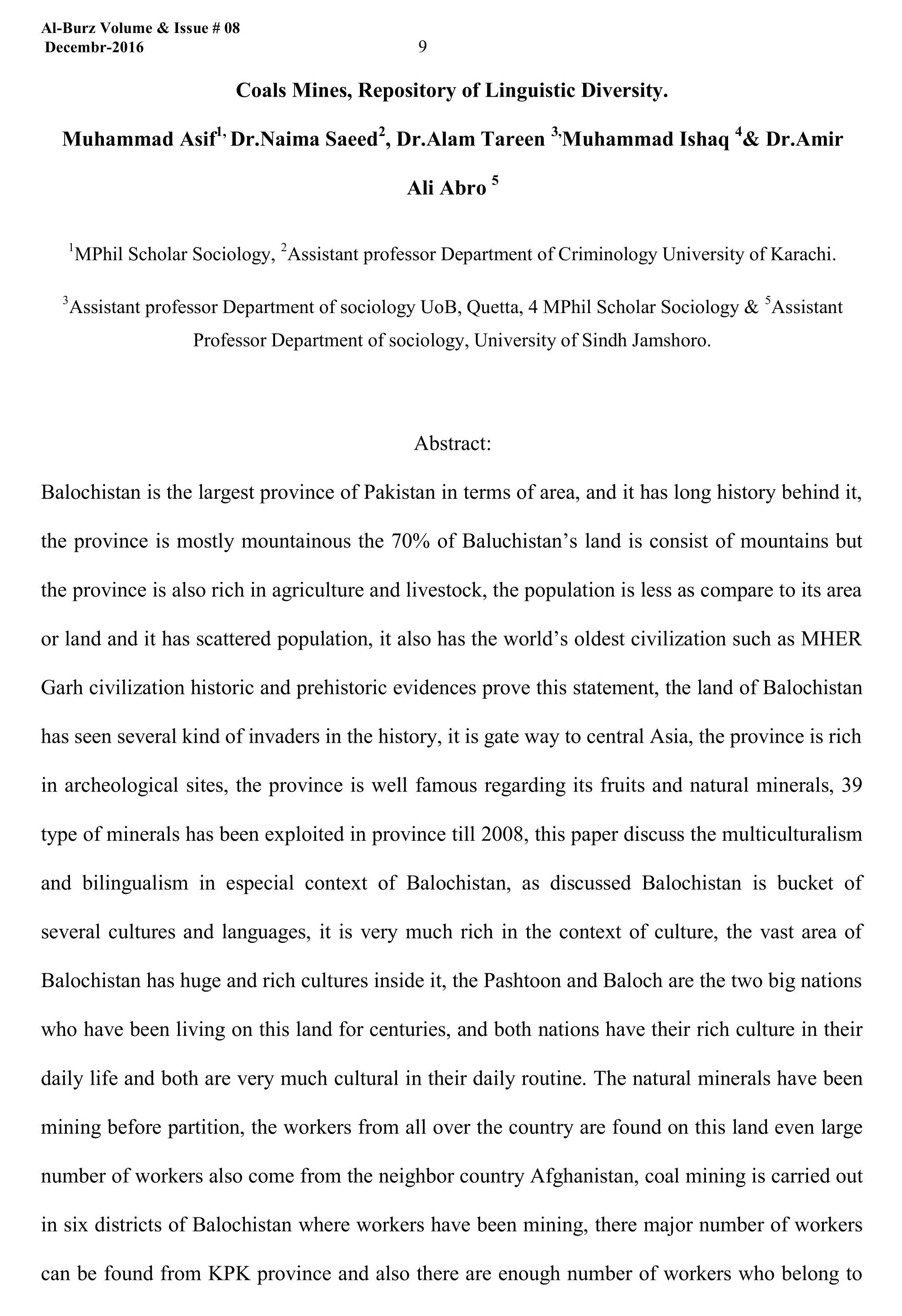Coals Mines, Repository of Linguistic Diversity
DOI:
https://doi.org/10.54781/abz.v8i1.139Keywords:
Coal Mine, Worker, Repository, LanguagesAbstract
Balochistan is the largest province of Pakistan in terms of area , and it has long history behind it , the province is mostly mountainous the 70% of Baluchistan’s land is consist of mountains but the province is also rich in agriculture and livestock, the population is less as compare to its area or land and it has scattered population, it also has the world’s oldest civilization such as MHER Gard civilization historic and prehistoric evidences prove this statement, the land of Balochistan has seen several kind of invaders in the history, it is gate way to central Asia, the province is rich in archeological sites, the province is well famous regarding its fruits and natural minerals, 39 type of minerals has been exploited in province till 2008, this paper discuss the multiculturalism and bilingualism in especial context of Balochistan, as discussed Balochistan is bucket of several cultures and languages, it is very much rich in the context of culture, the vast area of Balochistan has huge and rich cultures inside it, the Pashtoon and Baloch are the two big nations who have been living on this land for centuries, and both nations have their rich culture in their daily life and both are very much cultural in their daily routine. The natural minerals have been mining before partition, the workers from all over the country are found on this land even large number of workers also come from the neighbor country Afghanistan, coal mining is carried out in six districts of Balochistan where workers have been mining , there major number of workers can be found from KPK province and also there is enough number of workers who belong to Hazara tribe who speak Hazargi language and they have their own language and culture, in Mach coal fields the several languages and cultures are found.
References
Sheikh, K. H., & Arif, G. M. (1989). An Analysis of Rural Homelessness in Pakistan. The Pakistan Development Review, 28(4), 925-935.
Mahmood,S., Sheikh, K. H., Mahmood, T., & Malik, M. H. (1991). Food Poverty and its Causes in Pakistan [with Comments]. The Pakistan Development Review, 30(4), 821-834.
Sawada, Y., & Lokshin, M.(1999). Household schooling decision in rural, Pakistan.World Bank Policy Research Working paper, (2541).
Mandal, A. & Sengupta, D. (2000). The analysis of fatal accidents in Indian coal mines. Calcutta Statistical Association bulletin, 50, 95-118.
Ahasan, M. R., & Partanen, T. (2001). Occupational Health and Safety in the Least, Developed Countries-A Simple Case of Neglect. Journal of epidemiology, 11(2), 74-80.
Kawakami, T., & Kogi, K. (2001). Action-oriented support for occupational safety and health programs in some developing countries in Asia. International Journal of Occupational Safety and Ergonomics, 7(4), 421-434.
Finke man, R. B., Orem, W., Castranova, V., Tatu, C. A., Belkin, H. E., Zheng, B., ... & Bates, A. L. (2002). Health impacts of coal and coal use: possible solutions. International Journal of Coal Geology, 50(1), 425-443.
Husain, F., Qasim, M. A., & Sheikh, K. H. (2003). An analysis of public
Expenditure on education in Pakistan. The Pakistan development review, 42(4), 771-780.
Ross, M. H., & Murray, J. (2004). Occupational respiratory disease in mining. Occupational Medicine, 54(5), 304-310.
Donoghue, A. M. (2004). Occupational health hazards in mining: an Overview. Occupational Medicine, 54(5), 283-289.
Agnihotram, R. V. (2005). An overview of occupational health research in India. Indian journal of occupational and Environmental medicine, 9(1), 10.(43)Rolfe, J., Ivanova, G., & Lockie, S. (2006). Assessing the social and economic impacts of coal mining on communities in the Bowen Basin: summary and recommendations. Mackay, QLD: Centre for Environmental Management, CQU.
Memon, G. R. (2007). Education in Pakistan: The key issues, problems and the new challenges. Journal of Management and Social Sciences, 3(1), 47-55.
Atkins, A. S., Singh, R. N., & Pathan, A. G. (2008). Outburst risks in coal mining operations and application of social networks in knowledge management systems. Archives of Mining Sciences, 53(1), 31-52.
Singh, G. (2008). Mitigating environmental and social impacts of coal mining in India. Mining Engineers’ Journal, 8-24.
Malik, N., Maan, A. A., Pasha, T. S., Akhtar, S., & Ali, T. (2010). Role of hazard control measures in occupational health and safety in the textile industry of Pakistan. Pak J Agri Sci, 47(1), 72-76.
Rehman, H., Faridi, M. Z., & Bashir, F. (2010). Households saving behaviour in Pakistan: A case of Multan district. Pakistan Journal of Social Sciences (PJSS), 30(1), 17-29.
Awan, S., Nasrullah, M., & Cummings, K. J. (2010). Health hazards, injury problems, and workplace conditions of carpet-weaving children in three districts of Punjab, Pakistan. International journal of occupational and environmental health, 16(2), 113-119.
Pradhan, K., & Naik, A. K. (2010). Impact of Industrial Environment on Socio-economic Conditions of Mine Workers: A study of Coal Industries in Odisha.
Akram, W., Naz, I., & Ali, S. (2011). An Empirical Analysis of Household Income in Rural Pakistan: Evidences from Tehsil Samundri. Pakistan Economic and Social Review, 231-249.
Malik, M. S., Basit, A. B., & Qazi, A. K. (2011). Unions and Management: A Case Study of Pakistan Telecommunication Corporation. Pakistan Journal of Social Sciences (PJSS), 31(1), 185-199.
Hassan, S. A. (2012). Health, safety and environmental practices in the construction sector of Pakistan.
Sabir, A. R., & Razzaq, W. Multiculturalism

Downloads
Published
How to Cite
Issue
Section
License
Copyright (c) 2021 Alburz

This work is licensed under a Creative Commons Attribution-NonCommercial-ShareAlike 4.0 International License.
Alburz has licensed under a CC Attribution-NonCommercial-ShareAlike 4.0



